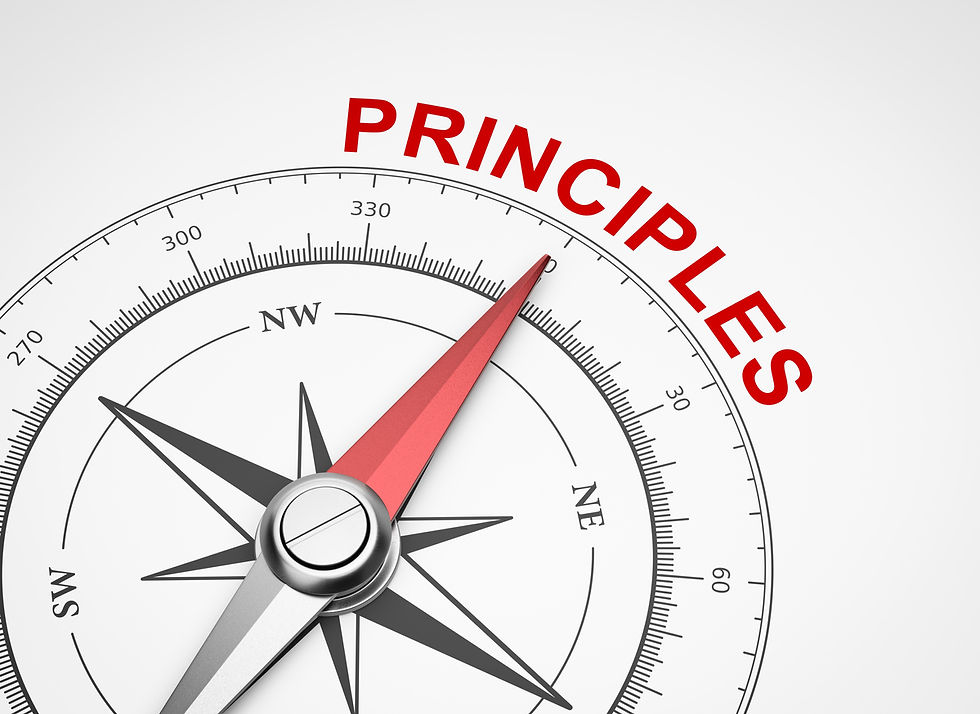by Bruce Cook
I was listening to Kentucky basketball coach John Calipari being interviewed on The Daily Stoic recently and several times he mentioned 'principles' and how they were essential to his operational culture and his team's success. The examples of principles he gave were along the lines of 'we share the ball' and 'we prioritise our teammates over ourselves'. To me this initially sounded like his version of the team's values.

At the same time, I have been doing some sponsorship strategy work that uses the same word - principles - to refer to something different, I thought. In sponsorship activation, or any marketing endeavour for that matter, once you've set your objectives and strategic approach, it helps to establish some key 'principles' that you can use to guide your decisions and actions as you move through the process.
As an example, when I was managing the RBS sponsorship of the Six Nations championship about 10 years ago, we were trying to integrate multiple RBS regional brands (RBS in Scotland , NatWest in England & Wales, Ulster Bank in Ireland) into a single sponsorship in order to maximise the investment impact across the business. In doing so, we had to decide which brands to use on which signage assets. If Ireland is playing a match in Scotland but the bulk of the TV audience is in England, which brand(s) do you put on the LED signage?
To guide our decision we agreed to the principle of: Perimeter signage is for the eyes of those in the stadium. We knew that the perimeter signage was also seen on TV in numerous markets, but we decided, for this sponsorship, that it was most impactful to those in the stands. They could best see the whole message, so the in-stadia fans took priority for this asset. Once we agreed on that principle, the decision became easy. The match is in Scotland, the people in the stands are mostly Scottish, so RBS - the Scotland brand - gets the perimeter signage. The principle - not the nuanced details of a specific match, camera angles or potential TV viewership - determines the action.

This at first seems very different from Calipari's principles that I thought felt like values. But I was wrong. Values are ideals that shape your state of mind, whereas principles guide your actions. Values and principles are definitely linked, but not the same. So the more I kick this around inside my noodle, the more I realise that Cal's Kentucky Basketball principles serve the same functions the marketing or general business principles I'm talking about. Who takes the last shot? Is it the best player or the one who's open? The ‘we share the ball’ principle says you swing the ball to the open man... no matter who he is.
Principles are a key bridge between goals and actions. I know Stephen Covey wrote about Principle Centred Leadership back in 1989 and many have done so since. Unfortunately, while we grasp the concept, too often the the practical application of principles is missed, or skipped, or forgotten.
Taking a step back, principles are a bit like unwritten traffic rules. Cars that approach a 4-way stop proceed in the order in which they arrive. Or, slower traffic to the inside, pass on the outside. These principles guide how you act/drive as you pursue your objective - safe arrival at your destination. A traffic value would be safety or courteousness (if that's a word). A traffic value of safety defines your general approach, but it does not tell you what to do as you move along the road... and it doesn't settle the dispute on right of way. Principles provide the clarity that is essential as you execute your strategy.
Whether you are a coach, a marketer, a C-suite exec or a parent, establishing clear principles BEFORE you are faced with the tough decision gives you firm ground to stand on and a clear view of the best way forward. "Dad, can I have some ice cream? Sorry son, you know the rule (principle), no dessert unless you clean your plate."
This principles principle seems simple and obvious, but I think too often it gets missed in business. We go straight from objective (increase sales) to decision (hire more salespeople) without establishing and adhering to principles. Quarterly training is required for all salespeople. More experienced sellers are expected to sell more. Willingness to collaborate with sales colleagues counts toward your bonus calculation. We hire new salespeople proportionally to any increase in sales targets. I’m sure there are better examples, but you get the idea.
If you follow a typical strategic hierarchy of Vision > Mission > Objectives > Strategy > Tactics, the principles (should) lie somewhere between Strategy and Tactics. They guide you from HOW you want to do things to WHAT you actually do in practice. If the strategy is to optimise brand exposure, you need principles to guide your execution. If the objective is to win championships and the strategy is to recruit players of high character, the principles of 'never promise a recruit playing time' and 'always be honest about how hard we work at practice' will influence how you speak to a recruit’s parents.
What do principles look like in other environments? Don't swing at a 3-0 pitch. Go on 16, stay on 17. All returns accepted, no questions asked. The boss’s door is always open. OK, I got it. Now I know what to do.
I guess the point I'm making is that once the strategy is agreed, we can all benefit from establishing some clear principles BEFORE we are faced with the big decisions.

The principles principle must be working for Coach Cal. He has to his name a March Madness national championship, six appearances in the Final Four, and 54 former players who have been selected in the NBA draft. We can't all expect that kind of success, but in the age of data-driven decisions, it would certainly be nice to have some solid rationale to justify our 'less numeric' decisions.
About that ice cream...
If you like this stuff and want to read more, the best way is on my Substack where you can read all back issues and subscribe so you will be alerted to all future Cook Endeavour blogs. Read on!
Comments